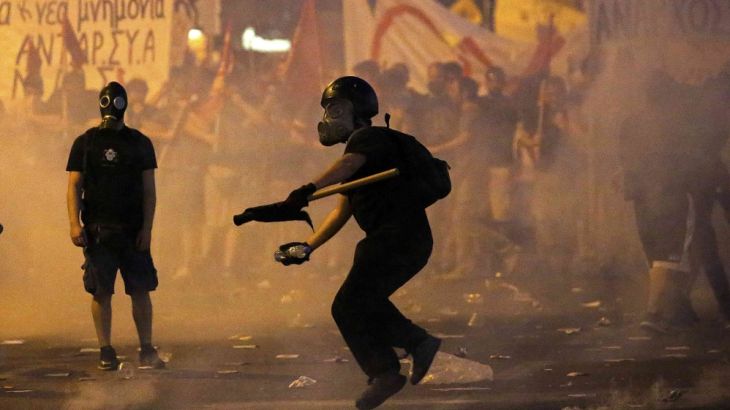EU central bank raises Greek credit after bailout vote
Central bank president Mario Draghi says emergency credit to Greek banks has been raised by $980 million.

The European Central Bank has thrown a financial lifeline to Greece, agreeing to raise the cap on emergency funding for the country’s banks by $980 million, after Athens approved reforms demanded by the Europe Union.
European Central Bank President Mario Draghi made the announcement on Thursday at a news conference in Frankfurt, Germany.
Greece is also on track to receive a $7-bn loan, after Eurozone finance ministers announced to keep the country afloat until a third bailout comes into effect.
“The Eurogroup welcomes the adoption by the Greek Parliament of all the commitments specified in the Euro Summit statement of 12 July,” the Eurogroup of the eurozone’s 19 finance ministers said in a statement after a conference call on Thursday.
The ministers also announced that they had made the decision to start discussions on a three-year bailout of Greece from Europe’s bailout fund, the European Stability Mechanism.
|
|
Greek banks have been closed since June 29 after the ECB opted against raising the credit it makes available.
Credit ratings agency Moody’s says Greece’s approval of austerity measures “averts an immediate disorderly default and potential exit from the euro” but warns that “risks remain elevated” given substantial skepticism within the country on the bailout conditions.
Al Jazeera’s Simon McGregor-Wood, reporting from Athens, said the announcement is “a little bit of good news” for Tsipras.
“He needs to turnaround a skeptical Greek public,” he said, adding that the political challenges facing the prime minister “are coming thick and fast.”
Amid violent protests overnight, the Greek parliament voted early on Thursay in favour of tough austerity reforms in a bid to save the country from bankruptcy, despite opposition from a number of government legislators.
The package passed with 229 votes in favour in the 300-seat chamber, but 38 Syriza legislators abstained or voted against the government, including including former Finance Minister Yanis Varoufakis, current Energy Minister Panagiotis Lafazanis, Deputy Labour Minister Dimitris Stratoulis and speaker of parliament Zoe Constantopoulou.
Prior to the vote, Prime Minister Alexis Tsipras made a final appeal for support of the tough bailout measures imposed by European partners this week, telling legislators there was no alternative, even though he disagreed with the measures.
“We don’t believe in it, but we are forced to adopt it,” Tsipras said.
The measures had to be approved by parliament before European partners would agree to open talks on a new multibillion euro bailout.
Independent eurozone analyst Yannis Koutsomitis told Al Jazeera that he expected a government reshuffle following the vote, as two or three ministers had voted against the bill.
However, Koutsomitis said he did not expect the prime minister to resign.
On Wednesday night, riot police used pepper spray and tear gas to fight back youths who were hurling Molotov cocktails and rocks at police during an anti-austerity protest in Athens.
Police said about 12,500 people were at the rally at Syntagma Square.
The clashes broke out just as lawmakers were starting to debate the austerity bill, which includes consumer tax increases and pension reforms.
Tsipras, has faced strident opposition to the bill from his own radical left Syriza party, but said it was the best possible deal he could get to prevent Greece from being forced out of Europe’s joint euro currency.